|
|
|
Sort Order |
|
|
|
Items / Page
|
|
|
|
|
|
|
| Srl | Item |
| 1 |
ID:
152109
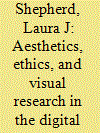

|
|
|
|
|
| Summary/Abstract |
Fifteen years ago, Roland Bleiker’s profound and influential article outlined a research agenda for those who take seriously the nature of aesthetic encounters with the social world. A rich and sophisticated literature addressing theoretical and methodological aspects of visual research in IR has emerged through the ‘aesthetic turn’ in International Relations (IR) theory.1 Efforts to theorise, or represent, global politics that are inspired by an aesthetic approach do not seek to produce the ‘most accurate’ theory or representation. ‘Approaching the study of IR with an aesthetic sensibility encourages scholars to pay analytical attention to affect rather than reason, judgement rather than fact, sensation rather than intellectualism’.
|
|
|
|
|
|
|
|
|
|
|
|
|
|
|
|
| 2 |
ID:
182451
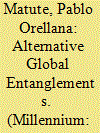

|
|
|
|
|
| Summary/Abstract |
While the call for broader conceptions about the political in general, and International Relations in particular, points to the need to redirect attention to the entanglements of societies, species and environments, in this article I address the way in which this proposed shift might still be reproducing anthropocentric understandings of global politics if serious attention is not devoted to the ontological foundations of the discipline. To do so, I first engage in a problematisation of decolonial efforts drawn from the Latin American experience that stress knowledge diversification as a means to emancipation. I then attempt to demonstrate that an exclusive intellectual engagement with entanglements and detachments might also be misleading, for their conventional conception is dependent on certain ontological commitments inherent to knowledge production, namely mind-world dualism and the linear conception of time. I therefore propose the notion of ‘detachment from knowledge’ as an alternative ontological practice through which IR students can themselves grapple with the dualist and anthropocentric oppressor/victim logic at the root of any emancipatory project. Such practice, I finally argue, not only allows us to understand the ‘global’ as indivisible, but also to engage with it beyond the exclusive pursuit of emancipation through knowledge, however diverse or decolonial it might be.
|
|
|
|
|
|
|
|
|
|
|
|
|
|
|
|
| 3 |
ID:
195078


|
|
|
|
|
| Summary/Abstract |
This article explores what it means to ‘animalise’ International Relations (IR). The posthuman move in the social sciences has involved the process of de-centring the human, replacing an anthropocentric focus with a view of the human as embedded within a complex network of inter-species relations. In a previous work we drew attention to the lack of analysis within International Relations of the key role played by more-than human animals in situations of conflict. The current COVID-19 pandemic again indicates that an analysis of international relations that does not have at its core an understanding of a more than human world is always going to be an incomplete account. The paper argues for the animalising of International Relations in order to enhance inclusivity, and suggests five ways in which this might be approached. As it becomes increasingly clear that a climate-related collapse is imminent, we argue for a transformative approach to the discipline, stressing interlinked networks and a shared vulnerability as a political project which challenges capitalism (advanced/late/carboniferous/genocidal) and the failure of states to address the concatenation of crises that life on the planet confronts.
|
|
|
|
|
|
|
|
|
|
|
|
|
|
|
|
| 4 |
ID:
197516


|
|
|
|
|
| Summary/Abstract |
The recognition of natural entities like rivers, forests, and mountains as subjects of rights is becoming an important trend throughout the world. It is a result of efforts by legal and environmental activists, Indigenous groups, and civil society organizations united under – among others – the Rights of Nature (RoN) movement that contest the binary separation between human and nature. The International Tribunals of Rights of Nature (ITRN) play a unique role by issuing judgments based on this perspective. But are they pluriversal in the sense that allow the coexistence of different worlds? The argument here is that they can open spaces for the pluriverse, of different worlds relationally interconnected. This does not happen without complications, for hearings and proceedings can also be interpreted as pertaining to or coopted as modern/Western (liberal) understandings of rights. Yet, saying that tribunals are hybrid would be reductionist. This paper seeks to address this drawing from pluriversal relationality, political ontology, and cosmopolitics to identify the relational nuances that reveal the pluriverse. For this it focuses on the ways participants engage in the hearings, the roles they play, and the worlds they bring with them. This paper conducts an analysis proposing alternative viewpoints that can reframe and reground IR through relational approaches.
|
|
|
|
|
|
|
|
|
|
|
|
|
|
|
|
| 5 |
ID:
197110


|
|
|
|
|
| Summary/Abstract |
Mary Graham and Morgan Brigg’s philosophical approach to Indigenous political ordering and inter-polity relations breaks new ground for scholarly and practice deliberations about Indigenous diplomacy. Our response takes up questions of the meaning, practice, and efficacy of Indigenous diplomacy with reference to wider Indigenous diplomacy in the Pacific which we call Oceanic Diplomacy. We contextualise Australian developments in relation to the region before considering examples from Pacific diplomatic practice to show how Indigenous diplomacy can be a valuable game changer or flawed window dressing. We also consider points of similarity and difference with their approach to ideas of ‘relationalism’ and ‘survivalism’. Overall, we argue that their principled approach to the philosophy of ‘relationality’ will find resonance in the Pacific and is necessary to counter instrumental approaches to the mobilisation of Indigenous diplomacy to be effective.
|
|
|
|
|
|
|
|
|
|
|
|
|
|
|
|
| 6 |
ID:
156245
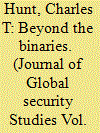

|
|
|
|
|
| Summary/Abstract |
The multiplicity of sources of security and justice in post-colonial states are often categorized according to a series of fixed analytical binaries. Such reductive dichotomies often mask the fluid and evolutionary ecology of these highly networked actors. As a result, the ways in which they co-produce social order are seldom well-understood and the ramifications for peacebuilding remain underexplored. This article examines the relationships between myriad providers of security and justice. Using examples from fieldwork in West Africa, it presents a case for a relational approach to peacebuilding that introduces the concept of symbiosis to develop a framework for evaluating these relations. It argues that the framework and conceptual steps involved create important opportunities for both new research and emerging practices of peacebuilding.
|
|
|
|
|
|
|
|
|
|
|
|
|
|
|
|
| 7 |
ID:
159963
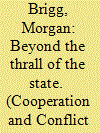

|
|
|
|
|
| Summary/Abstract |
Although the idea of the state pervades the scholarship and practice of international interventions, developing adequate knowledge of intervention contexts such as Solomon Islands requires decentring dominant perceptions about possible sources of socio-political order. In response, this article demonstrates the value of ‘relationality’ and ‘affect’ for analysing the diverse ways in which governance arises as an effect of social practice, without assuming that the state is unimportant or romanticizing statelessness. Giving conceptual priority to relations over entities while considering hitherto neglected affective forms of human interaction enables the identification of diverse micro-political forms of socio-political order and peace governance effects. An autoethnographic examination of relational-affective peace governance in post-conflict Solomon Islands shows that circulations of affect, feeling and emotion attach more strongly to customary and church institutions than they do to the state or to international interveners. This demonstrates the need to engage with unexpected sources of governance while the requirement to analyse findings within a broader historical frame signals the need to also engage with the state. A relational-affective approach, which has the potential for wider application, thus provides a way of analysing and engaging with diverse forms of political order in international interventions beyond the predilections of Northern scholarship.
|
|
|
|
|
|
|
|
|
|
|
|
|
|
|
|
| 8 |
ID:
175128
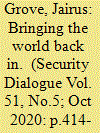

|
|
|
|
|
| Summary/Abstract |
Quantum physics is being positioned as a new archive for addressing major theoretical problems in the field of international relations. Two of the major proponents of engaging quantum thinking within international relations, James Der Derian and Alexander Wendt, have argued that quantum thinking offers the possibility of a major paradigm shift in the field. Before we determine quantum’s revolutionary potential, the persistent and most pressing question for me is how to position quantum thinking among other kinds of and claims to knowledge. I want to horizontalize where different kinds of knowledge sit within the renewed attention to quantum theory. Rather than just horizontalize or flatten ontology, I want to see what happens when we place scientific and philosophical inquiry in dialogue, and what that conversation does to the authority and value of quantum thinking for the social sciences. The article reconstructs the dialogue between the first generation of quantum physicists and the philosophers who informed them. Rather than make an explicit argument about the philosophical debt of physics, I argue that a broad and highly interdisciplinary set of questions drove both fields well beyond the specific areas of expertise of any of these thinkers. I believe this adventure of ideas followed by physicists, philosophers, and social theorists alike offers us a way forward as the complexity of our contemporary global challenges confront us now with the necessity to think well beyond our disciplinary expertise.
|
|
|
|
|
|
|
|
|
|
|
|
|
|
|
|
| 9 |
ID:
187534
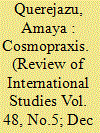

|
|
|
|
|
| Summary/Abstract |
Bringing ontological questions back into IR has been key to opening discussions about plurality and difference in terms of the coexistence of related and plural worlds and realities, for example through notions such as relationality and pluriversality. The problem is that in trying to develop relational approaches as an alternative to the ‘Western/modern’ – atomistic – ontology, relationality, relations, and their meanings can become fixed, translating them into ‘things’. The article maintains that cosmopraxis – as a complex pluriversal, multidimensional set of experiences – not only illustrates how relations relate without fixing their meaning, but also provides us with relevant insights to contribute to think of a pluriversal and more plural IR.
|
|
|
|
|
|
|
|
|
|
|
|
|
|
|
|
| 10 |
ID:
194056


|
|
|
|
|
| Summary/Abstract |
This article analyses the activities of Chinese embassies in ASEAN member states during the COVID-19 pandemic, understood as one part of China's efforts to reshape the regional order towards a more informal structure it calls ‘consultative governance'. The article begins by providing a theoretical explanation of informal practices in international politics and the Chinese cultural and political context. It mainly focuses on the concepts of ‘track two diplomacy' and ‘peripheral diplomacy’. The empirical section then outlines how China, within its pandemic diplomacy, actively fostered relations with Southeast Asian countries. It notes that this was not a one-size-fits-all approach. China diversified its informal tactics to secure regional interests and promote network-based regional consultative governance. Chinese diplomats prioritised economic interests while cultivating network politics. They engaged with political, party, and military elites while strengthening relations with the Chinese diaspora.
|
|
|
|
|
|
|
|
|
|
|
|
|
|
|
|
| 11 |
ID:
129484
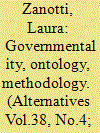

|
|
|
|
|
| Publication |
2013.
|
| Summary/Abstract |
Some critical international relations scholars have adopted theories of governmentality both as a heuristic framework for exploring modalities and functions of power and as a descriptive tool to explore the oppressive effects of global liberalism. I argue that, as a descriptive tool, much governmentality literature remains rooted in the same substantialist ontology and epistemology as the liberal discourses it seeks to criticize. This ontological orientation especially has a bearing on conceptualizations of political agency, which remain confined to the liberal struggle of power and freedom. I suggest that reimagining political agency calls for a reorganization of the ontological and epistemological framework of international relations in non-substantialist ways. The analysis maps non-substantialist positions across disciplinary lines. By treating power and subjects as deeply imbricated, non-substantialist ontologies examine political engagements as processes of hybridization aimed at producing practical effects in specific contexts.
|
|
|
|
|
|
|
|
|
|
|
|
|
|
|
|
| 12 |
ID:
159165
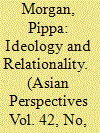

|
|
|
|
|
| Summary/Abstract |
Conventional studies of Chinese aid to Africa typically neglect China's six decades of donor experience, and de-emphasize the distinct historical relationships that China holds with African countries and the ideological and geopolitical contexts in which these relations were built. Applying the framework of relationality that highlights the role of social relationships in defining rational actions, I provide an alternative perspective on Chinese aid by analyzing the ideological and Cold War dynamics that shaped China's early Mao era aid allocation and the impact of these initial ties on contemporary Chinese policymakers' choices about where to direct Chinese aid.
|
|
|
|
|
|
|
|
|
|
|
|
|
|
|
|
| 13 |
ID:
182978
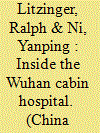

|
|
|
|
|
| Summary/Abstract |
This article examines the making and circulation of vlogs on the Chinese platform Douyin during the Wuhan lockdown. We specifically draw attention to vlogs made in mobile cabin hospitals. Constructed between February and March in 2020, cabin hospitals were part of the state’s isolation and quarantine efforts, and these hospitals created spaces of confinement within a city under lockdown. The vlogs that we refer to are often bursting with energy, optimism, and play, and seem to be expressive of new modalities of care and social relationality. But they are also appropriated by the Chinese state, who used them as examples of ‘positive energy’ (正能量), and to promote the collective commitment to contain the virus. Focusing on the videos, blogs, and narrative storytelling of Li Jing, we show how the state appropriated her work to further its attempt to control the meaning of life and death during the ‘people’s war’ on the coronavirus. These and other state appropriations must also be understood within the context of the state’s involvement in platforms such as Douyin and the ‘platformization’ of everyday life both before and during the Wuhan lockdown.
|
|
|
|
|
|
|
|
|
|
|
|
|
|
|
|
| 14 |
ID:
183221
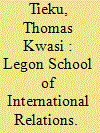

|
|
|
|
|
| Summary/Abstract |
The article explores the Legon School of International Relations (LSIR) which is the research, teaching, and academic programming of International Relations (IR) at the University of Ghana, Legon. The LSIR came out of attempts to decolonise knowledge production, dissemination, and academic programing in Ghana in early 1960s. The article shows that the LSIR is decolonial in theoretical perspective, grounded in southern epistemologies, relational in ontology, qualitative in methodology, practice-based, and it is equity-oriented. Although the LSIR scholarship as a package is distinctive, some of its ideas overlap with the work of several contemporary IR communities in the West. The article highlights implications of the LSIR story for the IR communities in the West and the value of paying close attention to the works of IR centres of scholarship in Africa.
|
|
|
|
|
|
|
|
|
|
|
|
|
|
|
|
| 15 |
ID:
168865
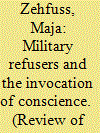

|
|
|
|
|
| Summary/Abstract |
During the Iraq War, some US soldiers refused (re)deployment. While liberal states appear to protect individuals’ right not to fight against their moral convictions by allowing the right to conscientious objection, those whose objections do not align with the regulations have to break the law in order to follow their convictions. This article explores how the legitimation of liberal war is challenged when we listen to the stories such refusers tell. Focusing on the United States, it briefly sets out the normative context such soldiers faced, highlighting the distinction between permissible conscientious objectors and contemptible deserters. Drawing on Judith Butler, it then focuses on two refusers by reading their own accounts of themselves in their memoirs. Despite not being eligible under the regulations, both invoke their conscience to make their refusal intelligible. By listening to their detailed accounts, the article traces the production and disruption of their subjectivities in relation to the prevailing moral order. Although invoking conscience appears to provide the chance to embrace an authentic self in a bid to resist the problematic moral order, subjectivity remains fractured due to relationality. Put differently, the sovereign subjectivity required by liberal war is simultaneously undermined by it.
|
|
|
|
|
|
|
|
|
|
|
|
|
|
|
|
| 16 |
ID:
184143
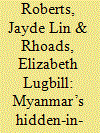

|
|
|
|
|
| Summary/Abstract |
This article examines nalehmu, a set of informal relational practices for negotiating power across scales which have facilitated access and enforced accountability through mutually recognized norms and social sanctions in Myanmar. Like Asef Bayat’s “quiet encroachment” in the Middle East, nalehmu is Myanmar’s discreet and prolonged practice of agency that has enabled ordinary people to survive and better their lives despite the multiple ruptures in Myanmar’s history, as seen most recently in the February 2021 coup d’état. The paper analyzes how nalehmu serves as a hidden-in-plain-sight social infrastructure across three different scales: relations of mutuality, obligation, and reciprocity between individuals; implicit connections for accessing goods, services, and recognition; and a means of interacting with the state via the nalehmu economy. This analysis seeks to do more than add a different case to studies of urban Southeast Asia, but also to help produce further theorization that takes seriously the actually existing contexts and practices in the global South.
|
|
|
|
|
|
|
|
|
|
|
|
|
|
|
|
| 17 |
ID:
197113


|
|
|
|
|
| Summary/Abstract |
In the inaugural Coral Bell School lecture on Indigenous Diplomacy, Mary Graham and Morgan Brigg challenge dominant Western ways of thinking by explicating the relationalist ethos. This ethos resonates very strongly with my work on Pasifika relationality and relational theology and philosophy. In my response to their lecture, I explain how contradictions, despite the influence of binary or either/or thinking, deserve to be viewed as ‘mutual’ rather than ‘competing’ through a ‘whole of life’ perspective that is often part of Indigenous peoples’ relational cosmologies. I then turn to resonances with ‘tōfā taofiofi,’ or the wisdom of the restraint from my Samoan culture, particularly in relation to decision-making. This and similar approaches suggest the value of slowing down and attending to the relational cosmos in our politics and diplomacy. The challenge, nonetheless, is how Indigenous peoples, both of Australia and the Pasifika, can shift their advocacy to another level to translate their wisdom to inform political and economic policies and development frameworks that are heavily controlled by Eurocentric structures of thinking and ordering.
|
|
|
|
|
|
|
|
|
|
|
|
|
|
|
|
| 18 |
ID:
179778
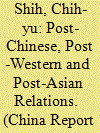

|
|
|
|
|
| Summary/Abstract |
Arguing that studies of China must simultaneously be studies of East Asia, this article offers a philosophically critical reflection on the meaning of Chineseness in lieu of the theme of the special issue—East Asia. The two regions are reciprocally holographical of each other. The latter part of the article will further propose a research agenda of post-Asianness. I hope to convey a message that is hidden but strong: that East Asia is a redundant agenda and yet fungible at the same time. This ontological irony can be likewise applied to both Chineseness and Asianness. Ultimately, China, East Asia and Asia are mainly strategic agendas and identities. The critical reflections outlined in this article are intended to display, facilitate and complicate the pluriversality of all post-identities.
|
|
|
|
|
|
|
|
|
|
|
|
|
|
|
|
| 19 |
ID:
187532


|
|
|
|
|
| Summary/Abstract |
This article will attempt to ‘provincialise’ (Chakrabarty, 2000) the ‘secular cosmology’ of International Relations (IR) through an examination of the relational cosmology of dharma. We argue that IR is grounded in ‘secularised’ Judaeo-Christian assumptions concerning time, relations between self and other, order, and the sovereign state that set the epistemic limits of the discipline. These assumptions will be ‘provincialised’ through an engagement with dharma based on a reading of The Mahābharāta, one of the oldest recorded texts in the world. We argue that the concept of dharma offers a mode of understanding the multidimensionality of human existence without negating any of its varied, contradictory expressions. By deconstructing notions of self and other, dharma illustrates how all beings are related to one another in a moral, social, and cosmic order premised on human agency, which flows from ‘inside-out’ rather than ‘outside-in’ and that is governed by a heterogenous understanding of time. This order places limits on the state's exercise of power in a given territory by making the state responsible for creating social conditions that would enable all beings to realise their potential, thus qualifying the principle of state sovereignty that remains the foundation of the ‘secular cosmology of IR’.
|
|
|
|
|
|
|
|
|
|
|
|
|
|
|
|
| 20 |
ID:
165122
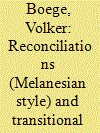

|
|
|
|
|
| Summary/Abstract |
This article examines kastom reconciliations as practiced in a Melanesian cultural context in the resolution of everyday disputes and as a means of peacebuilding after large-scale violent conflict. It explores Melanesian-style reconciliation in relation to the conventional international discourse on transitional justice, asking whether kastom reconciliations are – or can be – an alternative to, or a specific ‘vernacularised’ form of, transitional justice. Using examples primarily from post-conflict Bougainville and Solomon Islands, the article addresses some of the strengths and limitations of kastom reconciliation in comparison to those of transitional justice. In conclusion it is posited that protagonists of transitional justice could gain insights from the study of Melanesian reconciliations that would help them to reflect on their own taken-for-granted assumptions and consider avenues for developing the concept of transitional justice, making it more meaningful, effective and legitimate in a context such as Melanesia.
|
|
|
|
|
|
|
|
|
|
|
|
|
|
|
|
|
|
|
|
|